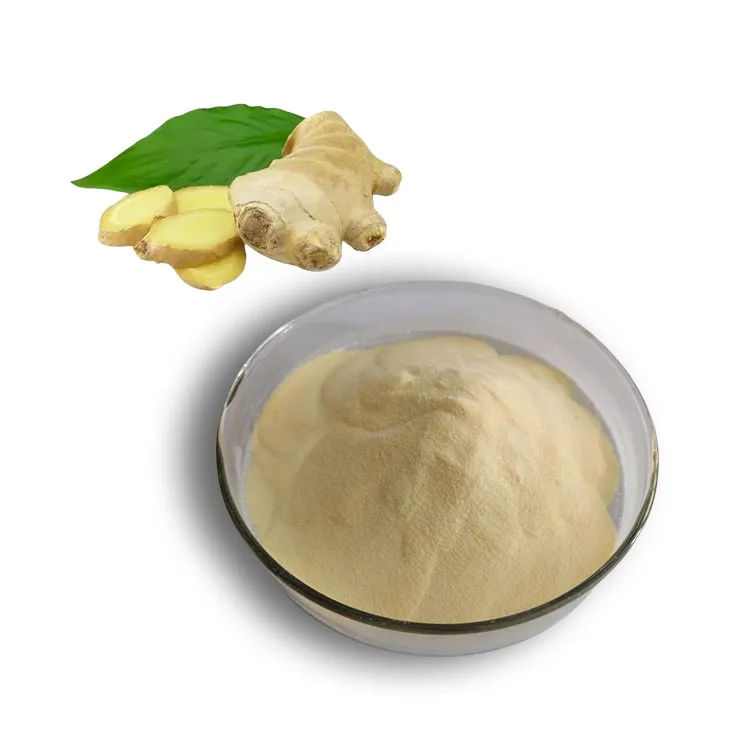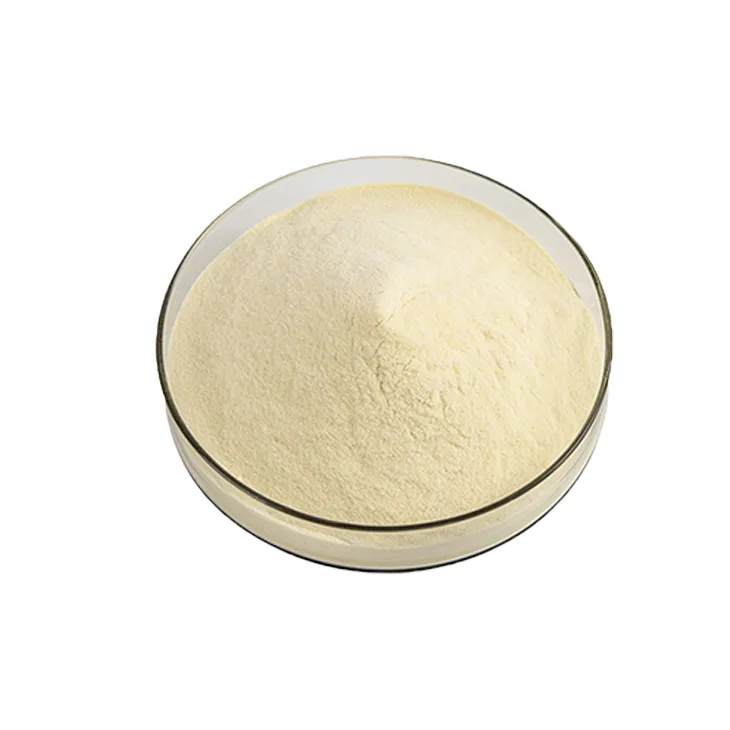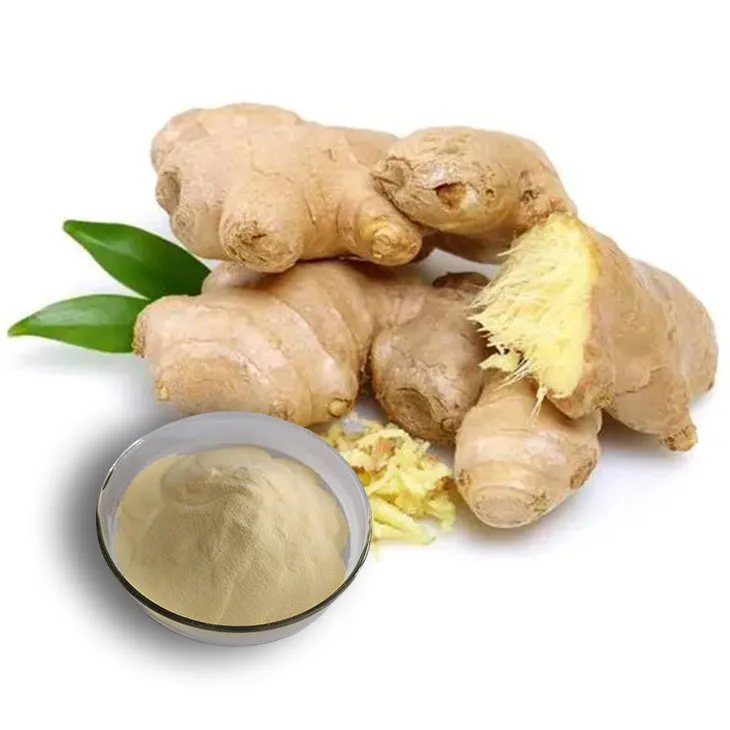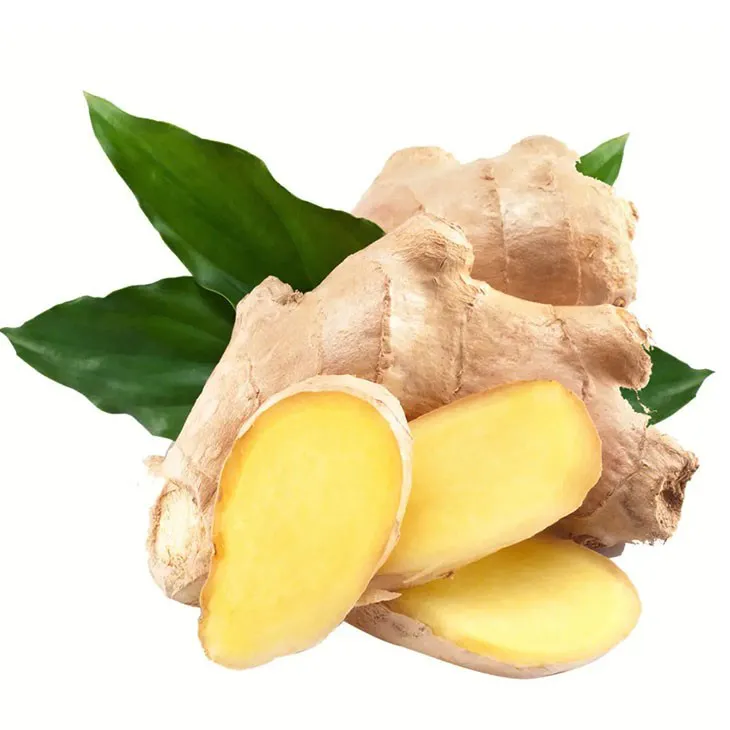- 0086-571-85302990
- sales@greenskybio.com
Ginger extract can reduce high blood pressure.
2024-11-13

Introduction
High blood pressure, or hypertension, is a prevalent and serious health condition that affects a significant portion of the global population. It is a major risk factor for various cardiovascular diseases, including heart attacks, strokes, and heart failure. While there are numerous medications available for managing hypertension, there is an increasing interest in exploring natural remedies. Ginger, a well - known spice used in cooking and traditional medicine for centuries, has emerged as a potential candidate for reducing high blood pressure. The Ginger Extract contains a variety of bioactive compounds that may interact with the body's physiological mechanisms related to blood pressure regulation.

Bioactive Compounds in Ginger
Ginger contains several important bioactive compounds that are believed to contribute to its potential blood - pressure - lowering effects.
1. Gingerols
Gingerols are the primary pungent components in ginger. These compounds have antioxidant, anti - inflammatory, and vasodilatory properties. Vasodilation is the process by which blood vessels widen, which can lead to a reduction in blood pressure. Gingerols may act on the endothelial cells lining the blood vessels, promoting the release of nitric oxide (NO). NO is a key signaling molecule that relaxes smooth muscle cells in the blood vessel walls, causing them to dilate. This dilation results in decreased peripheral resistance, which is one of the main factors contributing to high blood pressure.
2. Shogaols
Shogaols are formed from gingerols during the drying or cooking process of ginger. They also possess antioxidant and anti - inflammatory activities. Shogaols may enhance the effects of gingerols on blood vessel dilation and contribute to the overall blood - pressure - lowering effect of Ginger Extract. In addition, they may have an impact on the renin - angiotensin - aldosterone system (RAAS), which is a crucial hormonal system involved in blood pressure regulation.
3. Zingerone
Zingerone is another bioactive compound found in ginger. It has been shown to have antioxidant properties. While its direct role in blood pressure reduction is not as well - established as that of gingerols and shogaols, it may play a supporting role in the overall health - promoting effects of Ginger Extract. For example, by reducing oxidative stress, zingerone may help protect the blood vessels from damage, which can be beneficial in the context of hypertension.

Mechanisms of Action on Blood Pressure
Ginger extract may influence blood pressure through multiple mechanisms.
1. Endothelial Function Improvement
As mentioned earlier, gingerols can promote the release of nitric oxide from endothelial cells. Endothelial function is crucial for maintaining normal blood pressure. Dysfunction of the endothelium is often associated with hypertension. By enhancing endothelial function and increasing NO production, ginger extract helps relax blood vessels, reducing resistance to blood flow. This leads to a decrease in blood pressure. Moreover, the antioxidant and anti - inflammatory properties of ginger compounds can protect the endothelium from damage caused by oxidative stress and inflammation, further supporting its role in blood pressure regulation.
2. Modulation of the Renin - Angiotensin - Aldosterone System (RAAS)
The RAAS is a complex hormonal system that plays a central role in blood pressure control. In response to low blood pressure or other stimuli, the kidneys release renin, which then converts angiotensinogen to angiotensin I. Angiotensin - converting enzyme (ACE) further converts angiotensin I to angiotensin II. Angiotensin II is a potent vasoconstrictor and also stimulates the release of aldosterone, which promotes sodium and water retention, increasing blood volume and blood pressure. Ginger extract may interfere with this system at various levels. Some studies suggest that ginger compounds can inhibit ACE activity, reducing the formation of angiotensin II. This leads to less vasoconstriction and a decrease in blood pressure. Additionally, ginger may also affect aldosterone levels, although the exact mechanisms are still being investigated.
3. Anti - Inflammatory Effects
Chronic inflammation is often associated with hypertension. Ginger's anti - inflammatory properties can help reduce inflammation in the body. Inflammatory cytokines and mediators can contribute to endothelial dysfunction and vasoconstriction. By suppressing inflammation, ginger extract can improve blood vessel function and contribute to blood pressure reduction. For example, ginger may reduce the production of pro - inflammatory cytokines such as interleukin - 6 (IL - 6) and tumor necrosis factor - alpha (TNF - α), which are known to be involved in the pathophysiology of hypertension.
4. Antioxidant Activity
Oxidative stress is another factor implicated in high blood pressure. Reactive oxygen species (ROS) can damage endothelial cells, promote vasoconstriction, and increase blood pressure. The antioxidant compounds in ginger extract, such as gingerols and zingerone, can scavenge ROS and reduce oxidative damage. This protection of the blood vessels from oxidative stress helps maintain their normal function and can lead to a reduction in blood pressure.

Evidence from Scientific Studies
Several scientific studies have investigated the effects of ginger on blood pressure.
1. Animal Studies
In animal models of hypertension, ginger extract has shown promising results. For example, in rats with induced hypertension, treatment with ginger extract led to a significant decrease in blood pressure. These studies have demonstrated that ginger can affect various physiological parameters related to blood pressure, such as endothelial function, the RAAS, and inflammation. Animal studies provide valuable insights into the potential mechanisms of action of ginger on blood pressure, but they need to be further validated in human studies.
2. Human Studies
There have been a number of human studies examining the effects of ginger on blood pressure. Some clinical trials have reported a modest but significant reduction in blood pressure in hypertensive patients who consumed ginger extract. For instance, a study found that after a certain period of ginger supplementation, participants showed a decrease in both systolic and diastolic blood pressure. However, the results of human studies are somewhat inconsistent, which may be due to differences in study design, such as the dosage of ginger used, the duration of the study, and the characteristics of the study participants. More well - designed, large - scale human studies are needed to confirm the blood - pressure - lowering effects of ginger and to determine the optimal dosage and treatment duration.

How to Incorporate Ginger Extract for Blood Pressure Management
If you are considering using ginger extract for blood pressure management, there are several ways to incorporate it into your daily routine.
1. Ginger Tea
One of the simplest ways is to make ginger tea. You can grate fresh ginger root and steep it in hot water for about 10 - 15 minutes. You can add a little honey or lemon for taste. Drinking ginger tea regularly may provide some of the potential blood - pressure - lowering benefits. However, it's important to note that the concentration of ginger compounds in homemade ginger tea may vary depending on the amount of ginger used and the brewing method.
2. Ginger Supplements
Ginger supplements are also available in the form of capsules or tablets. These supplements are often standardized to contain a specific amount of ginger extract. When choosing a ginger supplement, it's important to look for a reputable brand and check the label for the amount of active ingredients. It's also advisable to consult a healthcare provider before starting any supplement, especially if you are taking medications for blood pressure or other health conditions, as ginger may interact with certain drugs.
3. Using Ginger in Cooking
Adding ginger to your cooking is another great way to increase your ginger intake. Ginger can be used in a variety of dishes, such as stir - fries, soups, and curries. However, the amount of ginger used in cooking may not be sufficient to achieve a significant blood - pressure - lowering effect on its own, but it can be a part of a comprehensive approach to blood pressure management that includes a healthy diet, regular exercise, and other lifestyle modifications.
Potential Side Effects and Precautions
While ginger is generally considered safe for most people, there are some potential side effects and precautions to be aware of.
1. Gastrointestinal Disturbances
Some people may experience gastrointestinal side effects when consuming ginger, such as heartburn, indigestion, or diarrhea. These side effects are usually mild and can be minimized by reducing the amount of ginger consumed or taking it with food. People with a history of peptic ulcers or other gastrointestinal disorders should be especially cautious when using ginger.
2. Bleeding Risk
Ginger has anti - platelet properties, which means it may increase the risk of bleeding. This is especially a concern for people who are taking blood - thinning medications or have a bleeding disorder. If you are in either of these categories, it's important to consult your healthcare provider before using ginger extract.
3. Interaction with Medications
As mentioned earlier, ginger may interact with certain medications. For example, it may affect the metabolism of drugs that are processed by the liver. Therefore, if you are taking any medications, it's crucial to inform your doctor if you plan to use ginger extract to avoid potential drug - interactions.
Conclusion
In conclusion, ginger extract shows promise as a natural remedy for reducing high blood pressure. Its bioactive compounds, such as gingerols, shogaols, and zingerone, may act through multiple mechanisms, including improving endothelial function, modulating the RAAS, reducing inflammation, and scavenging free radicals. While there is some evidence from both animal and human studies supporting its blood - pressure - lowering effects, more research is needed to fully understand its efficacy, optimal dosage, and long - term safety. If you are interested in using ginger extract for blood pressure management, it's important to do so under the guidance of a healthcare provider, taking into account potential side effects and interactions with medications. With further research, ginger extract may become an important addition to the arsenal of tools for managing hypertension, offering a natural and potentially complementary approach to traditional blood - pressure - lowering therapies.
FAQ:
1. How does ginger extract reduce high blood pressure?
Ginger extract contains various bioactive compounds such as gingerols and shogaols. These compounds may help relax blood vessels, which in turn reduces the resistance in the blood vessels. When the resistance is lowered, the heart doesn't need to pump as hard to circulate blood, thus leading to a reduction in blood pressure. Additionally, ginger may also have an impact on the body's hormonal and nervous systems, which are involved in regulating blood pressure.
2. Is ginger extract safe for long - term use in reducing high blood pressure?
For most people, ginger extract is generally considered safe for long - term use. However, some individuals may experience side effects such as gastrointestinal discomfort, including heartburn, diarrhea or stomach upset. People with certain medical conditions, like bleeding disorders or those taking medications that thin the blood, should consult their doctor before using ginger extract regularly, as ginger may interact with these medications or exacerbate these conditions.
3. How much ginger extract should be taken to effectively reduce high blood pressure?
The appropriate dosage of ginger extract for reducing high blood pressure has not been firmly established. Some studies suggest that doses ranging from 1 - 3 grams of ginger powder per day (equivalent to a certain amount of ginger extract) may have beneficial effects. However, individual responses may vary based on factors such as age, overall health, and the severity of hypertension. It is always best to start with a small dose and gradually increase while monitoring blood pressure and any potential side effects.
4. Can ginger extract replace blood pressure medications?
No, ginger extract cannot replace blood pressure medications at present. While ginger extract may have a positive impact on reducing blood pressure, it is not as potent or reliable as established blood pressure medications. Blood pressure medications are carefully formulated and tested to control blood pressure within a specific range. However, ginger extract can potentially be used as a complementary approach in conjunction with medications, under the guidance of a healthcare provider.
5. How long does it take for ginger extract to start showing an effect on high blood pressure?
The time it takes for ginger extract to show an effect on high blood pressure can vary. Some people may notice a small change in blood pressure within a few weeks of starting regular consumption, while for others it may take longer, perhaps several months. This is because the body's response to ginger extract depends on multiple factors, including individual metabolism, diet, and lifestyle.
Related literature
- The Effects of Ginger on Blood Pressure: A Systematic Review and Meta - Analysis"
- "Ginger Bioactive Compounds and Their Potential Role in Hypertension Management"
- "Ginger Extract: A Natural Agent for Cardiovascular Health, with Focus on Blood Pressure Regulation"
- ▶ Hesperidin
- ▶ citrus bioflavonoids
- ▶ plant extract
- ▶ lycopene
- ▶ Diosmin
- ▶ Grape seed extract
- ▶ Sea buckthorn Juice Powder
- ▶ Beetroot powder
- ▶ Hops Extract
- ▶ Artichoke Extract
- ▶ Reishi mushroom extract
- ▶ Astaxanthin
- ▶ Green Tea Extract
- ▶ Curcumin Extract
- ▶ Horse Chestnut Extract
- ▶ Other Problems
- ▶ Boswellia Serrata Extract
- ▶ Resveratrol Extract
- ▶ Marigold Extract
- ▶ Grape Leaf Extract
- ▶ blog3
- ▶ blog4
- ▶ blog5
-
Organic Tongkat Ali extract powder factory.
2024-11-13
-
How to make powder with ashwagandha extract.
2024-11-13
-
Rosehip extract manufacturers from China.
2024-11-13
-
The best cat's claw extract in nature.
2024-11-13
-
Chinese Dandelion Leaf Extract Suppliers.
2024-11-13
-
Beta Carotene
2024-11-13
-
Ginger Extract
2024-11-13
-
Pueraria Lobata Extract
2024-11-13
-
Giant Knotweed Extract
2024-11-13
-
Berberis aristata Extract
2024-11-13
-
Mangosteen extract powder
2024-11-13
-
Angelica sinensis extract
2024-11-13
-
Hops Extract
2024-11-13
-
Phyllanthus Emblica Extract
2024-11-13
-
Citrus bioflavonoids
2024-11-13




















